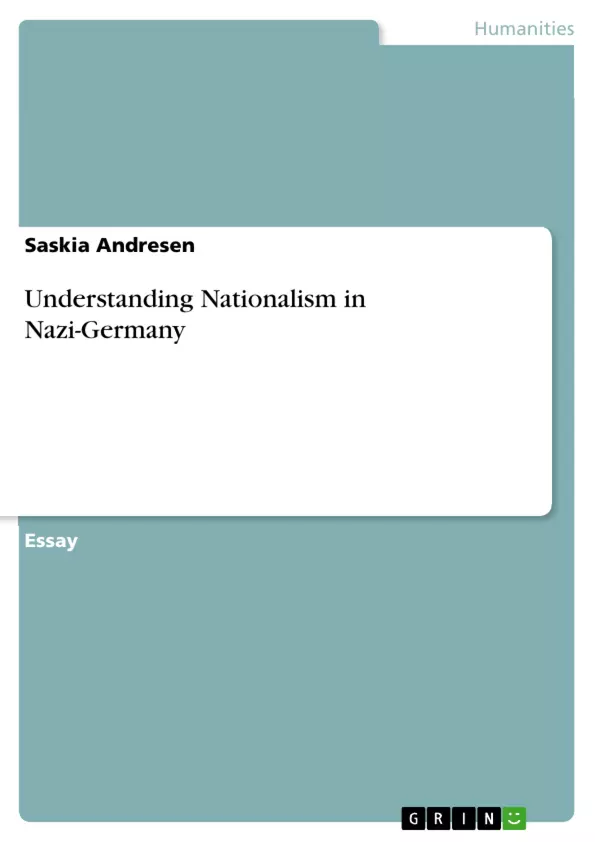Theoretical understanding using Elias' "The Germans", to construe a picture of Nationalism in Germany.
Elias demonstrates a profound working knowledge of the mentality behind the atrocities of the National Socialist movement in Nazi Germany. His book The Germans (1996) mainly focuses on the historical foundation and social psychological processes of cause and effect to illustrate sociological reasoning behind, as well as after, the rise of Hitler. The main theme throughout this paper will be the concept of Nationalism; in this sense, a social as well as political ideology including the connotations associated with the term and how they have changed.
This paper will attempt to explain the extremism behind Germany’s nationalist mentality as well as create a neutral platform for the concept by observing different points of approach. For example, at the other end of the spectrum there exists Anderson’s positive conception of nationalism through media and capitalism. In Imagined Communities (2001) he asserts that nationalism is a mental and cultural phenomenon necessary for functioning democracies, as well as political integration. The standards of national identity and what it means to develop and cultivate a believing population, have changed over the years by market economies, globalization, and capitalist enterprise today. Nationalism, still, takes the forefront of critique since the Holocaust even if in its simplest form, is a naturally occurring phenomenon.
Table of Contents
- Introduction
- Rise of the middle class: Nationalism
- 'Culture' and 'Civilization'
- National Civilizing Patterns
- The State Formation Process of Germany: Analysis and Conclusion
Objectives and Key Themes
This paper explores the rise of nationalism in Nazi Germany, examining its historical roots, social and psychological processes, and its role in the formation of German identity. It aims to understand the extremism behind Germany's nationalist mentality and to provide a neutral platform for the concept by observing different perspectives.
- The impact of industrialization and modernization on German society and its role in the development of nationalist sentiment.
- The shift from a focus on individual morality to a collective sense of national duty and obligation.
- The emergence of a "we image" and "we ideal" based on national tradition and heritage.
- The influence of nationalist ideology on the perception of other groups and the normalization of violence in the name of the state.
- The relationship between nationalism and the rise of the middle class in Germany.
Chapter Summaries
- Introduction: This section provides an overview of the paper's focus on nationalism in Nazi Germany and its historical context. It introduces the contrasting perspectives of Zygmunt Bauman and Benedict Anderson on nationalism.
- Rise of the middle class: Nationalism: This chapter examines the impact of industrialization and modernization on the development of nationalism in Germany, highlighting the shift from a focus on individual morality to a collective sense of national duty. It also explores the emergence of a "we image" and "we ideal" based on national tradition and heritage.
- 'Culture' and 'Civilization': This section delves into the changing definitions of "culture" and "civilization" in relation to nationalism, arguing that they transitioned from concepts of processes to concepts of unchanging states.
- National Civilizing Patterns: This chapter examines the specific civilizing patterns that emerged in Germany, focusing on the internalization of national norms and the development of a collective sense of identity.
Keywords
This paper focuses on the key concepts of nationalism, industrialization, modernization, collective identity, "we image", "we ideal", national duty, and civilizing processes. It explores how these concepts intersect and influence the development of German nationalism in the context of Nazi Germany.
Frequently Asked Questions
How does Norbert Elias explain German nationalism?
In his work "The Germans", Elias analyzes historical foundations and social-psychological processes to explain the specific development of the German national identity and its radicalization.
What is the "we-image" in the context of Nazi Germany?
It refers to the collective sense of national identity and tradition that became a central "we-ideal", prioritizing national duty over individual morality.
What is the difference between 'Culture' and 'Civilization' according to the text?
The text explores how these terms transitioned from describing processes to representing unchanging states, often used to define national superiority.
How did industrialization impact German nationalism?
Modernization and industrialization shifted society's focus toward a collective sense of national obligation, which was later exploited by nationalist ideology.
What does Benedict Anderson contribute to the understanding of nationalism?
Anderson views nationalism as a mental and cultural phenomenon ("imagined communities") necessary for functioning democracies and political integration.
- Citation du texte
- Saskia Andresen (Auteur), 2015, Understanding Nationalism in Nazi-Germany, Munich, GRIN Verlag, https://www.grin.com/document/294287



